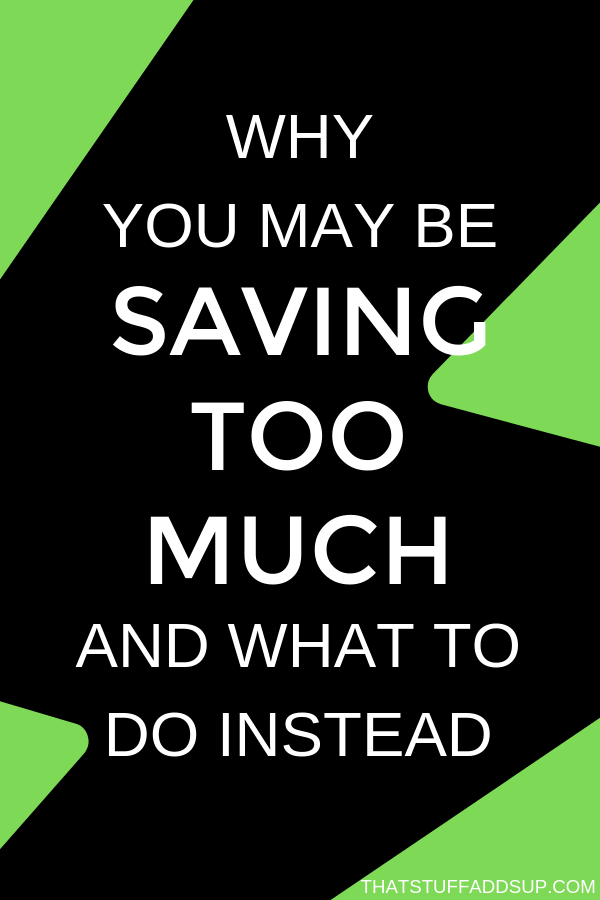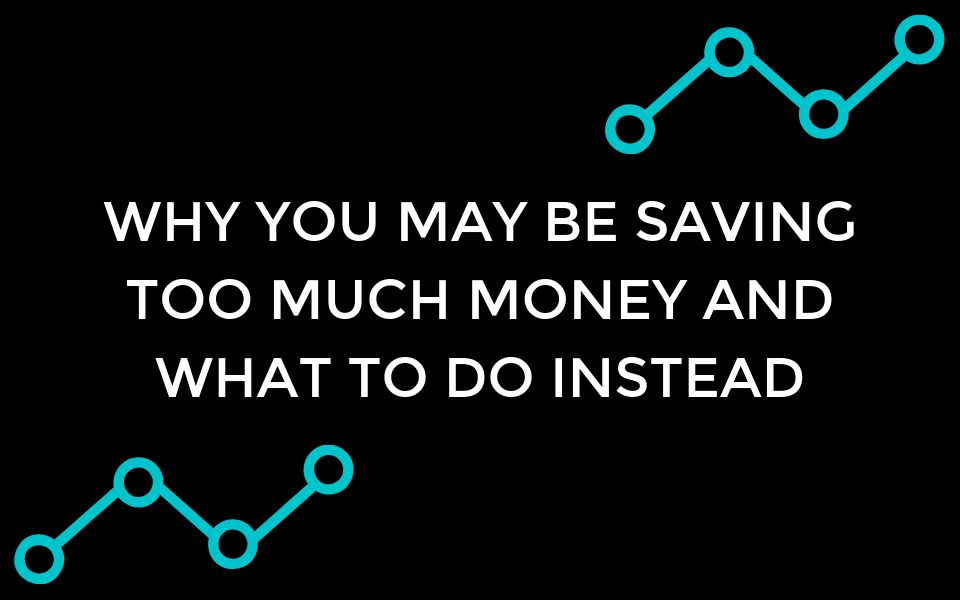Have you ever wondered how some people seem to build wealth much quicker than others?
Or, how retired people are able to draw an income for decades without having to work?
Well, it’s not by saving every dollar. It’s by investing your savings.
Many people take the advice “you need to save your money” too literally.
How you should read that advice is “you need to spend less money than you earn and invest the savings.”
Are you saving too much money? And, are you saving the right way?
Let’s find out.
How to save your money the right way and grow your wealth
In order to properly manage your money and get the most value from every dollar, you need to think of your “savings” as an investment.
That’s what all of your money is, like it or not.
Likewise, you need to have a sound understanding of what your savings are even earmarked for. You shouldn’t just stash all of your money in a savings account.
Let’s explore both of these concepts below.
Why you need to have an investing mindset rather than a saving mindset
Before we move on, let’s use the following definition of savings.
Savings are the funds you store in a low-risk form, including cash, checking accounts, savings accounts, money market accounts and Certificate-of-Deposits (CDs).
Do you believe “saving” is “investing”?
If not, I hope I can change your stance on this one. Everything you do with your money is an investment.
If you have cash sitting on your night stand, that’s an investment. If you have money sitting in a checking or savings account, that’s an investment. If you have money sitting in your 401K or a stock trading account, that’s an investment.
These are all investments because, like it or not, they gain or lose value over time.
And, they lose or gain value by forces largely out of your control.
I’m going to state this as simply as I can if you live in the United States.
You can either invest with the American economy or against it.
If you invest in your 401K, index funds, stocks and other securities, then you have the entire U.S. economy working for you!
If you invest in your cash and money in your savings account, then you have the entire U.S. economy working against you!
By investing in the stock market, we’ve historically been able to obtain long-term gains of 7% to 8% annually, on average.
By investing in cash, checking or other savings, you’re likely only gaining 0% to 3% in value annually. The higher returns are only if you have a high-yield savings account or Certificate-of-Deposit (CD).
However, the two scenarios above do NOT account for inflation.
In simplest terms, inflation is the rising “cost of living.”
Think about it, over the last century our living costs have steadily increased. From food, gas, vehicles, homes, you name it, each year we pay more and more due to increases in expenses.
Historically, inflation (our costs) have increased 2% to 3%, on average in the U.S.
Using basic math, you can see that by investing in the stock market, you’ll net 4% to 6% growth each year, on average after accounting for inflation.
In contrast, by investing in savings, you’ll net -3% to 1% loss/growth each year, on average after accounting for inflation.
Have I changed your mind yet?
Hopefully, you agree that hoarding all of your money in savings is not a way to build wealth.
Having said that, investing 100% of your money in the stock market is not the best idea either.
Depending on your personal situation, you need to have a balanced portfolio of stocks, bonds, savings and more.
Don’t worry, we’ll dive into investing strategies in future posts.
Moving on, let’s talk about how to save your money the right way.
How to save your money the right way
I’ve talked about the wrong way to save your money, which includes keeping it in cash, a checking account, or low-interest savings account.
So, what’s the “right” way to save your money?
In my opinion, the right way to save your money is to:
- Understand what your savings are for
- Calculate the minimum amount you need to maintain in savings
- Put your minimum savings amount in accounts that give you the best interest rates
- Put your remaining funds in other high-return investments
First, you need to understand what your savings will cover. Your savings should be used to mitigate financial risks that undoubtedly will pop up.
The most common things your savings should cover include job loss (loss of income), unexpected healthcare costs, and unexpected maintenance costs (vehicles, home, etc.).
Regarding a safety net in case you lose income, you should have 3 to 6 months’ worth of living expenses in your savings to protect your family.
In addition, you should have at least the amount of your health insurance deductible in a health savings account (HSA). Before you hit your health insurance deductible, you have to pay 100% of those costs before your insurance starts providing benefits.
Also, you should have enough funds in savings to cover a random maintenance expenses, such as purchasing 4 new tires for your vehicle, replacing your washer and dryer, repairing your transmission, and more.
Second, using the above items as a guide, calculate the minimum amount of funds you need to put in your various savings accounts.
If your monthly living expenses are $3,000, you have a health insurance plan with a $5,000 deductible, and you have a vehicle, then your minimum savings should be approximately:
- Job Loss Protection: $9,000 to $18,000
- Health Insurance Deductible: $5,000
- Unexpected Maintenance: $500 to $1,000
Summing these up, you would need between $14,500 to $24,000 in various savings accounts.
Third, you need to allocate your savings to the accounts that give you the best financial benefit.
For your job loss protection and maintenance funds, I recommend putting those in a high-yield savings account. Many, such as Ally Bank, currently offer 2.20% returns on your savings.
Why put your money in a 0.0% interest checking account or 0.01% savings account when you can earn 200 times that amount?
For your healthcare costs, I recommend putting those in a Health Savings Account (HSA) if you’re eligible for one. They are triple-tax advantaged, which will save you a ton of money. I’ll have a future post explaining these as well.
If you’re not eligible for an HSA, then put your deductible amount in a high-yield savings account.
Finally, if you have more than the minimum necessary amount in your savings related accounts, then you need to invest the remaining funds in other investments.
Start with your 401K, or similar account, if one is offered by your employer with a match. Your company’s percentage match is free money for you. Never pass it up.
Quick side note, if you’re nowhere close to having the minimum necessary savings mentioned above, then I hope you are extra motivated to save your money after reading this article.
Your and your family’s financial security depends on it.
Okay, now I hope you understand why we all need to become investors and not just savers.
So, why do people default to hoarding, I mean saving their money without investing?
Why people save too much and invest too little
There are two main reasons people tend to save too much money, or worse, none at all.
First, there is a lack of personal finance education in our education system.
Look, personal finance knowledge is not easy to grasp at a young age when, at the same time, we’re learning about ten other subjects and distracted by everything else the world has to offer.
Some lucky few will have great financial role models in their lives. In contrast, others are not so lucky.
We cannot rely on parents, many of whom are bad financial role models, to instill good personal finance principles into their children.
If we cannot depend on the adults in our lives to teach us personal finance skills, then we need to offer the education in our schools. And not just offer it, I mean require it as a mandatory subject.
The second main reason people save too much is to minimize risk and increase security.
Saving your money in a checking or basic savings account, or cash, is a near risk-free way to hold onto your money. This is what the majority of people do.
The more money they have control over, the less risk and more security they have in case something bad happens.
This is basic behavioral finance, which we see over and over again in history.
The best examples to draw on are peoples’ financial behaviors during and after a recession.
During and after the Great Recession, people were so scared that the U.S. economy was literally going to crash. So, what did they do?
They started pulling all of their money out of any and all investments, taking financial losses as they withdrew their money.
Then, they hoarded what little cash they did have. They either kept it in cash or put it in a basic checking and savings account.
The problem here is that their money, or assets, were no longer working for them.
Rather than weather the storm, which would allow them to build their value back up and earn even greater financial wealth in the long term, they stopped the bleeding, took their losses and lost out on a lot of investment growth.
Why? Because of risk aversion and the need for security. And, when you invest your money, you give up some control. Without control, people feel less secure and more at risk.
It’s as simple as that.
Now, what do these two primary reasons have in common?
They both require you to build your mental and emotional capacity.
If you can educate yourself on personal finance and manage your mentality and emotions with your money, then you will win the money game.
Now, let’s make sure you win the money game.
Become an investor, not a saver
If you want to be truly financially secure and grow your wealth, then you need to become an investor, not a saver.
Becoming an investor is not hard. Technically, you’re an investor if you contribute funds into your 401K, IRA or 403(b). And, like I said earlier, you’re an investor even if all you have is cash, a checking and savings account.
So, remove any pre-conceived ideas you have of what an investor is. They are not just the Warren Buffetts of the world or a licensed Investment Advisor.
YOU ARE AN INVESTOR.
Likewise, you are responsible for your, and your family’s, personal finances.
So, learn the basics of how to invest your money and starting investing today.
Sign-up for my e-newsletter below to be notified as soon as new posts are released!
Save the image below to Pinterest for future reference!


